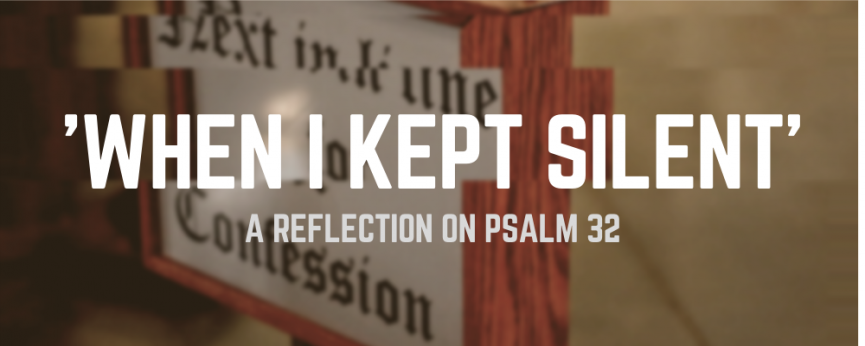Last Sunday, instead of a regular time of worship, we spent a rich time reflecting on Psalm 32 together and I wanted to capture and share some of this with you. The words of the Psalm are in bold and italics and are followed by a brief reflection. We begin at the beginning…
1 Blessed is the one whose transgression is forgiven,whose sin is covered.
2 Blessed is the man against whom the Lord counts no iniquity, and in whose spirit there is no deceit.
The Psalm begins with a strong statement that is communicated and repeated in three different ways: it says ‘happy’ or ‘blessed’ are…
- Those whose transgression is forgiven
- Those whose sin is covered
- Those to whom the Lord imputes no iniquity
Each of these phrases captures the same basic sentiment but in slightly different ways and the fact that it is repeated three times really emphasises the importance of forgiveness and the blessedness of being forgiven.
3 For when I kept silent, my bones wasted away through my groaning all day long.
4 For day and night your hand was heavy upon me; my strength was dried upas by the heat of summer.
5 I acknowledged my sin to you,and I did not cover my iniquity;I said, “I rwill confess my transgressions to the Lord, and you forgave the iniquity of my sin.
In verses 3-5 there is a shift in language and the Psalmist starts using the words ‘I’ and ‘my’ a lot, which signals that he is now beginning to speak from personal experience. The experience that the Psalmist describes here seems to have been a really difficult one for he speaks of his ‘body wasting away’, of ‘groaning all day long’, of ‘his strength being all dried up’, and as the hand of the Lord being ‘heavy upon him day and night’. These struggles all seemed to be linked to the fact that he had been ‘keeping silent’. But what is so bad about silence? Why would being quiet cause all these troubles?
The answer to these questions seems to be found in verse 5 as the silence that is causing all this difficulty and strife appears to be the silence of unconfessed sin. As the Psalmist begins to speak, to break his silence, and to pour out his heart before God he…
- Acknowledges his sin,
- Does not hide his iniquity,
- And confesses his transgressions to the Lord.
Again, just as in the opening verses, the Psalmist says the same thing in three different ways to give slightly different perspectives and to emphasise the importance of the act. The immediate result of this opening up and confession is that God ‘forgave the guilt of [his] sin’. The Psalmist has now shifted from one who was groaning, weak, and wasting away, to being the one described as ‘blessed’ or ‘happy’ due to the forgiveness of his sins!

‘No one who conceals transgressions will prosper, but one who confesses and forsakes them will obtain mercy’ – Proverbs 28:13
6 Therefore let everyone who is godly offer prayer to you at a time when you may be found;
surely in the rush of great waters, they shall not reach him.
7 You are a hiding place for me; you preserve me from trouble; you surround me with shouts of deliverance.
Having experienced such amazing grace, the Psalmist seems to want to tell and encourage others who might be struggling with the same things: he says ‘let all who are faithful offer prayer to you [for] at a time of distress, the rush of mighty waters will not reach them’. The Psalmist is one who has known a time of distress due to his sin and has discovered that the key to his freedom was to ‘offer prayer’, to call on God for help. In the act of breaking his silence and brining his darkness into the light, the Psalmist is not met with anger and judgment but instead he discovers a God who becomes a ‘hiding place’ for him, who ‘preserves him from trouble’, and who ‘surrounds him with glad cries of deliverance’!
8 I will instruct you and teach you in the way you should go; I will counsel you with my eye upon you.
9 Be not like a horse or a mule, without understanding, which must be curbed with bit and bridle, or it will not stay near you
It is this God that then appears to speak in verses 8-9 and who promises to…
- Instruct
- Teach
- And counsel the Psalmist in the way that he should go.
God says’ don’t be like a stubborn horse or mule that needs to be forced and coerced into going the right way or being obedient: instead, listen to my instruction, teaching, and counsel in order that you don’t go the way of destruction and death again.

‘Be not like a horse or mule, without understanding’
10 Many are the sorrows of the wicked, but steadfast love surrounds the one who trusts in the Lord.
11 Be glad in the Lord, and rejoice, O righteous, And shout for joy, all you upright in heart!
The Psalm ends by contrasting the experience of the wicked that is full of sorrows with the experience of those who trust in the Lord and who are surrounded by his steadfast love. It calls those who trust in the Lord to be glad, to rejoice, and to shout for joy in the knoweledge that they are no longer living a lie and that through honest and vulnerable confession of their sins they are now the upright in heart and are said to be ‘blessed’ and ‘happy’.
As always, we would love to hear from you and any thoughts oyu might have so please do leave a comment below!

